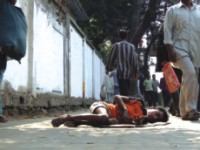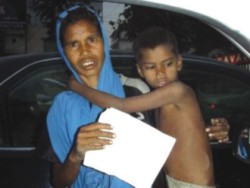|
Straight Talk
Begging for a Solution
Nadia Kabir Barb

The man was a tragic sight. He had only one arm and one leg. As he hobbled or rather hopped from one stationary car to another in front of us begging for money, we all looked on in dismay. Both limbs seemed to have been amputated and both were from the same side of his body. I think it may have been his left arm and leg. We seemed to be drawn to this sad spectacle unable to drag our gaze from him. Somewhere in the back of my mind it occurred to me that it was astonishing that he even managed to stay upright instead of toppling over. As the lights changed and he jumped to the island in the middle of the road to avoid being run over by the sea of cars anxious to get to their destinations, I put the money back in my purse. This was Dhaka --- I was sure to see him at the same traffic lights another day. In a city where the majority of people are living below the poverty line, seeing beggars on the streets is a common sight. It is a phenomenon that is endemic in developing societies such as ours and there does not seem to be any sign of it lessening any time soon. It is often hard to turn a blind eye to every beggar that comes knocking on the car window. We cannot ignore the fact that many of these people turn to begging as a way of scraping by and making ends meet due to their dire circumstances, however, we are also aware of the fact that many of these people are forced into a life of begging and are part of a much larger and highly organised operation. When we see the crippled young man making his way across the street, the old woman hunched and bent over, the child holding out her hand, one cannot but feel guilty especially when we compare how incredibly privileged our own lives are. We have our health, a roof over our head, food on the table and a million other blessings to count. But every time we reach into our pockets and give money, maybe what we are really doing is not helping the situation but perpetuating it and assuaging our own conscience.
 It is quite galling to think that begging has become yet another profession similar to that of a street hawker or peddler. These days I find myself buying popcorn, face towels, lozenges etc. from the streets whether I need them or not as these people are at least trying to earn a living rather than begging. In some cases people would far rather beg for a living than try and earn money through hard work. A friend of mine told me how she had offered a woman with a child a job in a factory. The woman made an excuse about not being to leave her child behind but when my friend mentioned that there was a crèche at the factory and the child would be looked after, she ran away! I also remember when I was growing up; hearing about two beggars who used to come to our neighbourhood hoping to collect alms. I even recall seeing them on a few occasions. One was thin and scrawny and always wore a torn lungi and vest. The other looked healthy, well fed and seemed to have clean clothes on whenever I saw him. Coincidentally they were both disabled as they walked with the aid of crutches and had the use of only one leg. A few neighbours decided to help these two men by offering to give them a lump sum of money to set up a shop or start up a small business. The first beggar took this gratefully and opened up a little paan shop down the road. Even after I left Dhaka, every year when I came back, I would see him sitting in his shop selling his paan, cigarettes, tea and biscuits. In fact the last I heard, he had passed away a few years ago and his sons had taken over from him. At least he held his head high and made something of his life. However, the other beggar refused the money and stated that it was more profitable for him to go from area to area begging rather than slog all day in a 'moodir dokan'. As one can imagine this did not sit well with those offering to help him and in future days, they did not open their doors to him when he came knocking. Every now and then I wonder what became of him. It is quite galling to think that begging has become yet another profession similar to that of a street hawker or peddler. These days I find myself buying popcorn, face towels, lozenges etc. from the streets whether I need them or not as these people are at least trying to earn a living rather than begging. In some cases people would far rather beg for a living than try and earn money through hard work. A friend of mine told me how she had offered a woman with a child a job in a factory. The woman made an excuse about not being to leave her child behind but when my friend mentioned that there was a crèche at the factory and the child would be looked after, she ran away! I also remember when I was growing up; hearing about two beggars who used to come to our neighbourhood hoping to collect alms. I even recall seeing them on a few occasions. One was thin and scrawny and always wore a torn lungi and vest. The other looked healthy, well fed and seemed to have clean clothes on whenever I saw him. Coincidentally they were both disabled as they walked with the aid of crutches and had the use of only one leg. A few neighbours decided to help these two men by offering to give them a lump sum of money to set up a shop or start up a small business. The first beggar took this gratefully and opened up a little paan shop down the road. Even after I left Dhaka, every year when I came back, I would see him sitting in his shop selling his paan, cigarettes, tea and biscuits. In fact the last I heard, he had passed away a few years ago and his sons had taken over from him. At least he held his head high and made something of his life. However, the other beggar refused the money and stated that it was more profitable for him to go from area to area begging rather than slog all day in a 'moodir dokan'. As one can imagine this did not sit well with those offering to help him and in future days, they did not open their doors to him when he came knocking. Every now and then I wonder what became of him.
 In the current economic climate, where the price of rice and food items has shot up, it is an even more cut throat world that beggars seem to live in. The whole concept of survival of the fittest has raised its head. It was only the other day my brother told me how a beggar had asked him for money. He had looked dishevelled, his clothes torn and dirty and his entire appearance was particularly woeful. As my bother was about to reach for his wallet, the beggar turned to another beggar coming towards the car, and in a threatening voice and demeanour far removed from the one he was portraying in front of my brother, told the old man that if he came near the car he would break his legs. He obviously thought that my brother would not hear him. Not only are beggars somehow bound by invisible geographic boundaries, they also seem to be getting more and more territorial and aggressive. The rapping on the window is much louder and more persistent, and as someone said to me if you refrain from giving them money, some beggars even kick the car as you drive by. The most worrying of the stories I have heard so far is about a group of young women that come and ask for money. They are relatively well In the current economic climate, where the price of rice and food items has shot up, it is an even more cut throat world that beggars seem to live in. The whole concept of survival of the fittest has raised its head. It was only the other day my brother told me how a beggar had asked him for money. He had looked dishevelled, his clothes torn and dirty and his entire appearance was particularly woeful. As my bother was about to reach for his wallet, the beggar turned to another beggar coming towards the car, and in a threatening voice and demeanour far removed from the one he was portraying in front of my brother, told the old man that if he came near the car he would break his legs. He obviously thought that my brother would not hear him. Not only are beggars somehow bound by invisible geographic boundaries, they also seem to be getting more and more territorial and aggressive. The rapping on the window is much louder and more persistent, and as someone said to me if you refrain from giving them money, some beggars even kick the car as you drive by. The most worrying of the stories I have heard so far is about a group of young women that come and ask for money. They are relatively well  dressed and have their hair tied neatly and even wear a little make up. But they carry a wooden box with them in which they carry snakes. If you make the mistake of opening your window and then refuse to pay, they use the snake to intimidate you! The people most vulnerable in these cases are passengers on CNGs and rickshaws. Luckily I have not had the misfortune to come across this particular form of begging yet. dressed and have their hair tied neatly and even wear a little make up. But they carry a wooden box with them in which they carry snakes. If you make the mistake of opening your window and then refuse to pay, they use the snake to intimidate you! The people most vulnerable in these cases are passengers on CNGs and rickshaws. Luckily I have not had the misfortune to come across this particular form of begging yet.
Dhaka seems to be heaving with its eleven million residents and there does not appear to be any respite for a city already bursting at the seams. With the constant influx of people migrating to Dhaka from the villages, compounded with the lack of adequate jobs and accommodation, it is almost impossible to envisage a solution to the problem of the rising numbers of beggars on the streets. In this instance I hope that I am proved wrong…
Copyright
(R) thedailystar.net 2008 |
